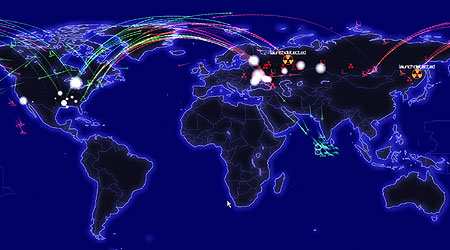On WarGames
November 01, 2006 ・ Blog

WarGames was just on TV. I’d forgotten how much I liked it - I’d even forgotten that I read the book a couple of times when I was little. It seems to me that it’s a reminder of how so many 80s teen films (especially those starring Matthew Broderick) are a lot better than their shallow modern counterparts.
Maybe that’s just my age talking, but WarGames has a subtle touch that most modern mainstream films lack. OK, the war-is-bad morality is hardly heavyweight, but seeing the idea of global thermonuclear war conveyed through the abstract lines of those Norad displays, along with brutally statistical casualty projections, measured in millions, is always powerful.
It tackles the subject of computers, videogames and hacking with a refreshingly low level of stereotyping. Broderick’s character, David Lightman, is not an awkward teenage nerd and even his hacker friends seem more roundly - and accurately - drawn than most filmic attempts, even if one’s fat and the other an Asperger’s candidate.
I also like WarGames’ unabashed fascination for computers, as well as its awed reserve for their inhumanity. I shared Lightman’s excitement at learning about Professor Falken and how he programmed computers to learn from their mistakes. That must have been a pretty heavy idea for audiences at the time. As, I guess, was the ability for computers to remotely connect to each other over the phone. The possibilities must have seemed astounding.
The best moment for me was when Falken is trying to convince Norad’s commanding general that what he’s seeing on screen - a thousand nuclear missiles bearing down on multiple US targets - is merely a construct of the computer. He asks him whether he’s really going to simply believe the computer without stopping to think about the fact that the Soviets launching without provocation or warning is madness.
WarGames also reminds me how much I need to play Defcon, Introversion software’s new game, which is utterly inspired by the film. The image above is a screenshot from it. Defcon is one of the most coldly beautiful games I’ve seen: a graceful apocalypse of missile trajectories traced against the world. Heck, I’ll download the demo right now.